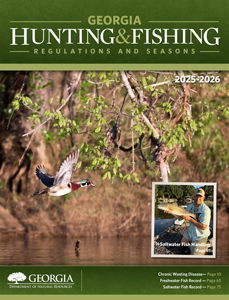Definitions
Artificial Lure
Any lure made completely of natural or colored wood, cork, feathers, hair, rubber, metal, plastic, tinsel, styrofoam, sponge, string, or any combination of such materials, in imitation of or as a substitute for natural bait. This does not include any item sprayed with or containing scented or chemical attractants.
Baiting
Bait: corn, wheat, other grains, salts, apples, and other feed that has been placed, exposed, deposited, distributed, or scattered so as to constitute a lure, attraction, or enticement to game animals or game birds.
It is unlawful for any person to:
- Hunt any game animal (except as noted below) or game bird upon, over, around, or within 200 yards of bait.
- Hunt any area for a period of 10 days following complete removal of all bait.
- Hunt any game or feral hog over bait, or place bait, on any State or Federal managed lands.
- Place bait in a manner that will cause hunting on an adjacent property to be prohibited.
Taking of any big game, other than deer, over bait is subject to a fine of $5,000 and/or imprisonment up to 12 months.
Exceptions for Deer and Feral Hogs:
- Deer and feral hogs may be hunted over or near any bait on private lands in all counties, provided the hunter has written permission from the landowner. It is unlawful to hunt deer over bait, or place bait, on any state or federally managed lands.
- Placing bait for deer or hogs may make a property (or portion of a property) un-huntable for other species, such as turkeys. Hunters are urged to communicate with others who may hunt other species on or near an area where baiting for deer or hogs is being considered.
Big Game
Bear, deer, and wild turkey. All other game animals (including alligators, furbearers, migratory game birds, and upland game birds) are considered "small game" for regulatory purposes.
Daily Limit
The number of fish or game animals that may be taken, caught, or killed during any one day.
Hunting
“Hunting” means pursuing, shooting, killing, taking, or capturing wildlife or feral hogs. This term also includes acts such as placing, setting, drawing, or using any device used to take wildlife or feral hogs, whether any such act results in taking or not, and includes every act of assistance to any person in taking or attempting to take such wildlife or feral hogs.
Fishing
Catching, capturing, taking, or killing fish, mussels and all seafood and includes all lesser acts such as attempting to catch, capture, or kill by any device or method and directly assisting any person in catching or attempting to catch fish or seafood.
Game Fish
Fish that are listed under Daily Limits.
Immediate Family
All persons living in one household under one head of household and bearing a blood or dependent relationship to the head of household.
Mountain Trout
Brook, Brown, and Rainbow trout and any hybrids of these species. Referred to in this Guide as “Trout.”
Nongame Fish
Any fish not designated as game fish under Daily Limits.
Public Fishing Area
Designated areas owned and/or operated by the Department of Natural Resources, Wildlife Resources Division, Fisheries Section for the primary purpose of fishing and are open to the public.
Resident
Resident means any person who has been domiciled within the State of Georgia (declared Georgia the only state of legal residence) for a period of at least three months. A valid Georgia driver’s license or Georgia ID is required to show residency. Nonresident full time Georgia college students with a valid college ID living in Georgia, and nonresident active duty military personnel with a valid U.S. DOD Common Access Card with Uniformed Services affiliation and the dependents of such military personnel may obtain resident hunting and fishing licenses other than resident lifetime, disability and honorary licenses. Nonresident landowners must purchase a nonresident license.

